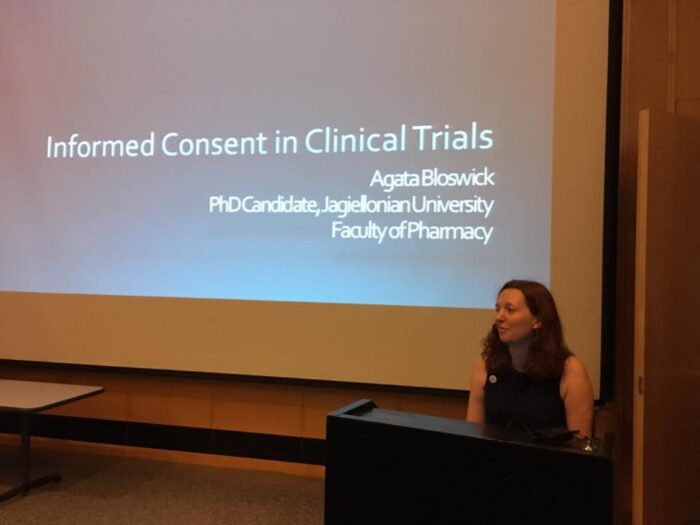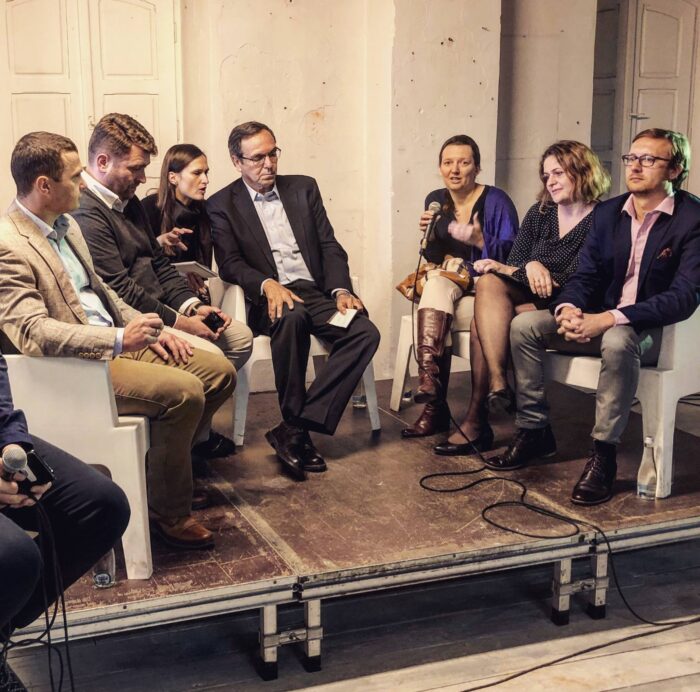Interview with Agata Bloswick by Kornelia Trzęsowska
Thank you for taking the time to share your insights on clinical project management. Let’s delve into the specifics of this niche in project management. What distinguishes clinical project management from other forms of project management?
Clinical project management uniqueness lies in its specific application within the drug development industry. Our focus is on testing new medicines on patients, involving human experimentation. As a result, we must adhere to a multitude of ethical and regulatory principles alongside the standard project management principles. Furthermore, the complexity arises from the diversity of these regulations across different countries. Despite these unique aspects, we face the same universal challenges of project management: time constraints, budget pressures and the demand for high quality.
 Fot. Agata's archive
Fot. Agata's archiveThank you for the clarification. What are the most common challenges that project managers encounter in the realm of clinical research projects?
COVID-19 vaccine development has highlighted the risks in clinical research that necessitates a complete reorganization of ongoing clinical trials. There is also significant competition in the field, with numerous similar products being researched simultaneously, which underscores the importance of speed and efficiency. Geopolitical events can also have a substantial impact on clinical research. Conflicts or political tensions in regions where clinical trials are conducted can also jeopardize patient safety and the smooth progress of trials.
Balancing the need to protect patients while ensuring project success presents a unique set of challenges. In clinical research, substantial financial resources are at stake. It takes years of research and numerous projects to develop a single drug for the market. The costs can run into billions of dollars, with approximately 180 to 200 compounds typically tested to find one that works. Therefore, efficient project management is essential to mitigate financial risks. Overall, the nature of the risks and their impact on the project sets clinical research apart, making it a field that requires specialized management skills.
Can you please clarify the role of a project manager in clinical research? Is the project manager responsible for conducting the research or solely managing the project involving research conducted by scientists?
The distinction is essential to understand. In clinical research, the actual research is conducted by medical professionals, often referred to as investigators. These investigators are typically doctors working in hospital clinics who are responsible for researching patients. The project manager’s role is to manage the project itself, not to perform the research. Project managers oversee a diverse team that includes clinical leads, data scientists, statisticians, medical professionals, regulatory specialists and more. Their responsibilities encompass managing the project’s various aspects, including budget, timelines, risk management and team coordination. They do not engage in patient care or direct research activities. The project manager acts as the bridge between the research team, or investigators and the project’s goals. They ensure that data is collected and reported as per the project’s objectives, adhering to ethical and regulatory standards.
 Fot. Chris Bloswick Presenting on the ethical considerations of clinical trials at Yale University
Fot. Chris Bloswick Presenting on the ethical considerations of clinical trials at Yale UniversityShifting the focus to technology, how do you envision the impact of technology, including artificial intelligence, on the future of clinical research project management and the broader healthcare sector?
Many data comparison and verification tasks, which are currently labor-intensive, can be streamlined and automated using AI. This will free up resources for more critical, human-centric aspects of clinical research. AI has the potential to create virtual placebo arms in clinical trials by modeling data from real-world sources. This innovation can significantly expedite the trial process and reduce the number of in-person visits required. As AI becomes integral to clinical research, project managers will be responsible for ensuring that these tools are programmed correctly and that they deliver the desired outcomes. Moreover, asking the right questions and critical thinking will become crucial skills for project managers, as AI is only as effective as the queries it receives. Project managers must be adept at formulating the questions that will yield meaningful insights. The intersection of technology and project management will be a critical area for project managers to navigate effectively, leading to more efficient and data-driven clinical research.
There shouldn’t be any innovation without taking care of sustainability. What does sustainability mean to you?
Sustainability is a multidimensional concept. It includes not only environmental aspects but also social and cultural dimensions which goes beyond just diversity and inclusion in teams. It involves a broader perspective, such as evaluating the working hours of our project teams. In global teams, often found in clinical trials, it’s crucial to ensure inclusivity and social sustainability, even when team members are spread across different time zones.
Equally important is the sense of belonging and well-being within the team. It’s not just about practical aspects like gender ratios, but also about creating an environment where everyone feels they have the opportunity to grow and contribute. What particularly excites me is the idea of positioning ourselves in a space where we acknowledge that the future will be different from the past. This is a vital mindset to adopt as we tackle sustainability issues holistically.
 Fot. Chris Bloswick Community building action – park spring clean-up
Fot. Chris Bloswick Community building action – park spring clean-upWhat can be introduced in clinical trial project management to keep this area more sustainable, and how can project managers contribute to it?
We can start with reducing wastage, for example, by optimizing the shipment of supplies like lab kits. The current system often results in excessive waste because we must ensure an adequate supply, which sometimes leads to wastage when not all kits are used.
Additionally, we should reconsider the need for physical visits by Clinical Research Associates (CRAs) to research sites. Can we conduct some tasks remotely, using AI-driven tools to perform checks and verifications? Sometimes, additional procedures result in patients making unnecessary trips, which isn’t socially sustainable. Can we rethink our procedures?
A broader concern in clinical trials is the impact of focusing solely on certain countries. By concentrating on a few countries for trials, we may inadvertently limit access to novel therapies for certain populations.
Also, many data collection activities in clinical trials involve the use of electronic diaries and specialized equipment like tablets. When these devices are used for a limited time and then discarded, it creates substantial waste.
With the experience of the COVID-19 pandemic, we understand that climate change can have far-reaching consequences. We need to be prepared for the spread of diseases like Zika, malaria, and dengue fever to new regions due to changing climates. These are paradigm shifts that require a shift in our approach to clinical trials and research priorities. We cannot focus only on ‘first-world’ diseases; we must consider the global impact of climate change on health and well-being.
Project managers can propose strategies like alternating on-site and remote visits, reevaluating travel budgets and minimizing waste. All of this comes down to preparation, awareness and a culture within the organization. But they can also help us fight the consequences of climate change.
Could you please share some of your personal experiences or any anecdotes that have shaped your perspective on sustainability as a leader?
In addition to my almost 17 years in clinical research, I have also been involved in sustainability efforts alongside my day job. This has included various activities, such as planting trees, educational initiatives and exploring different energy sources. I even led a campaign in Kraków to install solar panels in schools, initiated the creation of six new parks in Kraków and worked on transforming streets in the old town to make them greener.
Surprisingly, I realized that these two aspects of my life have had a significant influence on each other. When I started organizing these sustainability campaigns, I subconsciously applied my project management skills from my clinical trial work. Project management became second nature, as I had to plan, identify stakeholders, set timelines and create work breakdown structures to ensure successful campaign execution.
As a leader, I’ve found that the skills I gained from community campaigns have been invaluable. Motivating and rallying people toward a shared vision, goals and targets is essential, whether it’s leading a community cleanup or overseeing a large organization.
 Fot. Krakow dla Mieszkańców Debate accompanying the Open Eyes Economy Summit with Gil Penalosa about the sustainability in the cities
Fot. Krakow dla Mieszkańców Debate accompanying the Open Eyes Economy Summit with Gil Penalosa about the sustainability in the cities
Could you share examples of sustainable practices you have integrated into the planning and execution of clinical trials or research studies?
As an industry, we have faced pressure to reduce our carbon footprint, especially with the ambitious net neutrality goals set by big pharma companies for 2030. Clinical Research Organizations (CROs) performing clinical trials on behalf of pharmaceutical companies are contributing to the pharma industry’s overall emissions. While CROs are currently focused on internal emissions coming from their own operations, the day will come when pharma companies will ask what their external service providers are doing to become more eco-friendly.
In response to this challenge, the industry has initiated several changes. One of the initiatives I successfully led was to eliminate paper documents that were previously shipped worldwide. As clinical trial documentation is essential for regulatory compliance, this meant shifting to electronic storage or scanned copies for archival purposes. This transition towards a paperless system is becoming an industry standard, minimizing a major environmental impact.
Also under consideration are remote visits and data collection by using technology. The aim is to reduce the need for extensive travel by clinical research associates (CRAs) to monitor trial sites. A part of this effort has included developing what I call “heat maps” to identify the geographic locations of CRAs and match them with trial sites, optimizing (minimizing) their travel.
As the healthcare industry continually evolves, what resources and learning opportunities do you recommend for professionals who want to stay informed and excel in clinical research, project management and talent development?
In Poland, there is a unique landscape of resources and learning opportunities for professionals in the clinical research industry. Most notably, many large universities offer postgraduate programs in clinical trials. One standout program focuses on project management within the clinical trials domain and it adheres to the guidelines of the Project Management Institute (PMI). This program provides a comprehensive framework for project management in the clinical research sector. The best part is that these programs are usually led by industry experts.
Additionally, I would advise professionals to explore different aspects of clinical research, such as project delivery, client management and even startup operations. Attending conferences and workshops related to clinical research and project management can also be immensely beneficial. These events provide networking opportunities and insights into the latest trends and technologies shaping the industry.
What are the common pitfalls or misconceptions that professionals should avoid when managing clinical research projects and fostering a diverse talent pool?
I’d like to highlight how diverse talent can impact the diversity of patients in clinical research, which is an intriguing and often overlooked aspect. At the outset of a project, client teams and research organizations must decide which countries to include in a clinical trial. Frequently, these decisions are influenced by past experiences and the comfort of operating in familiar locations, which can lead to confirmation bias. Lack of diversity within the project management team, both in terms of experience and geographic knowledge, can have a significant impact on the selection of countries for clinical trials. Project managers may favor countries they are more familiar with, leading to the exclusion of others. This approach limits access to clinical trials for patients in underrepresented regions, affecting their healthcare.
Another pitfall to consider is the risk of deviating from established frameworks. These methodologies exist for a reason; they provide a structured framework to guide our work. In my experience over the past decade or so, I’ve observed that when teams deviate from using a consistent language, which these project management methodologies provide, projects are more likely to encounter difficulties and even fail. This aspect should be in the DNA of any project, including clinical trials.
Dr. Agata Bloswick is a corporate executive with 17 years of drug development experience in three different Fortune 500 companies, and has 10 years of experience leading sustainability initiatives in urban, social and industry settings. She has industry-wide experience including project management, emerging market development, business stream creation, and has led a global operations department of 2500 individuals. Agata’s background includes leadership and healthcare education from the London School of Economics, Yale University and Jagiellonian University.

[ENG] Project Manager based in Wrocław and fascinated by the IT industry and Agile management approach. She considers effective communication and openness to others to be her greatest strengths. Creativity is her second name and if not management – she would probably become a journalist. She is fluent in German, loves this language and culture, and therefore enjoys most working with clients from German speaking countries. After work, she recharges her inner batteries thanks to creative activities such as writing, painting or photography and reading about psychology. She has been active as a volunteer for several NGOs for a long time.
[PL] IT project managerka zafascynowana światem nowych technologii. Za najważniejszą w projektach uważa komunikację oraz budowanie stabilnego mostu pomiędzy światem zespołu ze światem klienta. Z wykształcenia filolożka, biegle posługująca się językiem niemieckim. Pasjonuje ją psychologia, joga, muzyka i wszystko, co kreatywne. Kocha rozmawiać z ludźmi, stąd została redaktorką Strefy Wywiadu. Wspiera wrocławski oddział PMI w budowaniu relacji z biznesem. Leaderka VI edycji Programu Mentoringowego PMI PC.